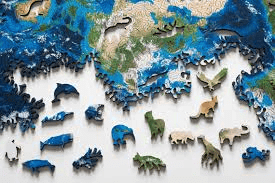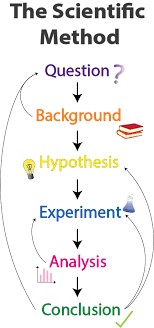Maximum Marks:30
Attempt all questions.
Question numbers 1 to 5 carry 1 mark each.
Question numbers 6 to 8 carry 2 marks each.
Question numbers 9 to 11 carry 3 marks each.
Question numbers 12 & 13 carry 5 marks each.
Q1: What is the role of experiments in science? (1 Mark)
(i) To confuse people
(ii) To test guesses and find evidence
(iii) To entertain students
(iv) To prove all ideas wrong
Ans: (ii)
The role of experiments in science to test guesses and find evidence. Experiments are conducted in science to test hypotheses, gather data, and provide evidence to support or refute scientific ideas.
Q2: Science can be compared to which of the following activities? (1 Mark)
(i) Reading a story
(ii) Solving a jigsaw puzzle
(iii) Cooking food
(iv) Playing a game
Ans: (ii)
Science can be compared to solving a jigsaw puzzle because, like fitting puzzle pieces together to form a complete picture, science involves gathering data and observations to build a comprehensive understanding of the natural world.
Q3: Which of the following is an example of using the scientific method in daily life? (1 Mark)
(i) Deciding what to wear
(ii) Checking why a light bulb is not working
(iii) Choosing a favorite color
(iv) Tasting different dishes
Ans: (ii)
Checking why a light bulb is not working is an example of using the scientific method in daily life. It involves observing the problem, forming a hypothesis (e.g., the bulb might be burnt out), testing the hypothesis, and analyzing the results. Q4: Which of these is an example of science in nature? (1 Mark)
Q4: Which of these is an example of science in nature? (1 Mark)
(i) A butterfly transforming from a caterpillar
(ii) A car running on fuel
(iii) A robot working in a factory
(iv) A plane flying in the sky
Ans: (i)
Q5: What is essential for a good scientist? (1 Mark)
(i) Curiosity
(ii) Physical strength
(iii) Wealth
(iv) Popularity
Ans: (i)
Curiosity is essential for a good scientist because it drives them to ask questions, seek out new knowledge, and explore the unknown, leading to discoveries and advancements in science.
Q6: What is the purpose of science? (2 Marks)
Ans: The purpose of science is to understand the world we live in by observing, asking questions, and conducting experiments to uncover the secrets of the universe.
Q7: What is the scope of scientific exploration? (2 Marks)
Ans: The scope of scientific exploration is vast and limitless. It ranges from studying our planet Earth and its ecosystems to exploring the depths of oceans, the vastness of outer space, and everything in between— such as materials, living organisms, and natural phenomena.
Q8: Describe the process of scientific inquiry. (2 Marks)
Ans: Scientific inquiry involves several steps observing something interesting, asking a question about it, formulating a hypothesis (a possible answer), testing the hypothesis through experiments or further observations, analyzing the results, and drawing conclusions based on evidence.
Q9: Explain the scientific method using the example of a pen that stops writing. (3 Marks)
Ans:
- When a pen stops writing, the scientific method involves observing the problem, asking why it happened, guessing possible reasons (hypotheses), and testing these guesses.
- For instance, one might guess that the ink is finished and check the refill. If the ink is not finished, another guess might be that the ink dried up.
- Testing this hypothesis could involve trying to unclog the pen. This step-by-step process of hypothesizing and testing is the essence of the scientific method.

Q10: How can studying Science help in solving bigger problems and mysteries of the universe? (3 Marks)
Ans:
- Studying Science equip us with the skills to solve larger and more complex problems by enhancing our ability to observe, analyze, and experiment.
- It encourages critical thinking and systematic problem-solving, which are essential for addressing global challenges, such as environmental issues, medical advancements, and technological innovations.
- Science provides the tools and methodologies needed to explore and understand complex phenomena and find effective solutions.

Q11: What steps should one follow to find answers to scientific questions? (3 Marks)
Ans:
- Observe an interesting phenomenon.
- Ask questions about it, formulate a hypothesis (a possible answer),.
- Test the hypothesis through experiments or further observations, and analyze the results to see if they support the hypothesis.
This systematic approach helps in drawing accurate conclusions and building a body of scientific knowledge. Q12: Explain why science is compared to a jigsaw puzzle. (5 Marks)
Q12: Explain why science is compared to a jigsaw puzzle. (5 Marks)
Ans:
- Science is compared to a jigsaw puzzle because each discovery in science is like a piece of a puzzle that adds to our overall understanding of the natural world.
- Just like in a puzzle where every piece fits together to form a complete picture, in science, every experiment and observation helps to build a more complete understanding of nature.
- For example, when scientists discover something new, it helps to explain or clarify how the world works, just like finding the right piece of a jigsaw puzzle helps to complete the picture. This process of fitting pieces together in science helps us to see the bigger picture of how things in the world are connected and how they work together.
Q13: Describe how science can help us understand the natural world, using examples from different environments (e.g., ocean, mountains, space). (5 Marks)
Ans: Science helps us understand the natural world by studying different environments and learning how they work. For example,
In the oceans, scientists study the behavior of marine life, the movement of ocean currents, and the impact of pollution on aquatic ecosystems. These studies are crucial for understanding biodiversity and maintaining the health of our oceans, which play a vital role in regulating the Earth's climate.
In the mountains, research focuses on how plants and animals adapt to cold and harsh conditions, as well as how geological processes like erosion shape the landscape over time. This knowledge helps in conserving mountain ecosystems and predicting natural disasters like landslides.
In space, scientists explore the stars, planets, and galaxies to gain insights into the origins of the universe and the fundamental laws of physics. Space exploration also helps us understand the potential for life beyond Earth and the effects of space travel on human health.
On Earth, science helps us understand weather patterns and climate change, which are critical for predicting natural events like storms, floods, and droughts. This understanding guides efforts to mitigate the effects of climate change and protect the environment.
By studying these different environments, science helps us understand the world better, protect nature, and find ways to solve problems like climate change and pollution.


















